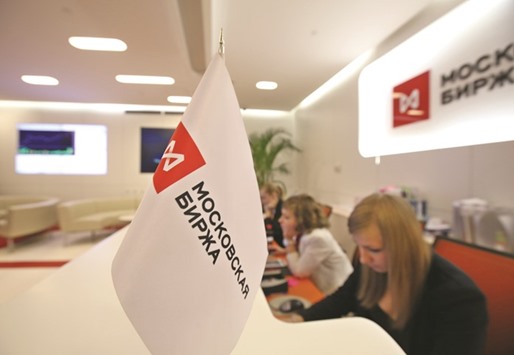Strategists from some of the biggest banks are growing increasingly bullish on Russian stocks after an oil-driven surge put them among the top performers in the world. Investors? Not so much.
Take UBS, for example. While equity strategists there turned bullish on Russia in July, the bank’s asset management division, which oversees $1tn for some of its richest clients, has a neutral position on the stocks.
Russian equities started this year with the biggest quarterly gains since 2012, prompting strategists from JPMorgan Chase & Co to Julius Baer Group to join their peers from Bank of America Corp to Wells Fargo & Co in advising clients to buy them.
Fund managers from UBS Wealth Management in New York to Union Bancaire Privee in London are sceptical that the rebound, which has closely followed a rally in commodity prices, will last very long.
Gary Greenberg, a London-based fund manager at Hermes Investment Management, was among those who passed on buying Russian stocks this year.
“There were a lot of short positions in oil which were closed, and an advance in oil prices helped Russian stocks rally, but I am still rather sceptical about oil prices and I don’t think the rally in Russian stocks is sustainable,” Greenberg said by phone from London last week. “A tactical short-term trade on the back of a commodity rally is one thing. It has nothing to do with fundamental investment.”
Russia’s economy is forecast to contract 1.5% this year, according to the mean estimate of 44 economists surveyed by Bloomberg.
They forecast that growth will resume at the beginning of next year, while in late December they saw the recovery starting in the third quarter of 2016.
The world’s largest energy exporter is mired in its second year of recession as oil selling for less than half its five-year average price exacerbates the impact of sanctions linked to the Ukraine conflict.
Greenberg, whose Global Emerging Markets Fund has beaten 96% of its competitors over the past year, said this quarter’s recovery in oil prices isn’t enough to start buying the country’s equities considering the broader challenges the companies still face. Russian assets make up about 4% of the $850mn fund.
Russian equities have rallied this year as oil soared about 40% from a 13-year low in late January. Odeniyaz Dzhaparov, senior portfolio manager at Deutsche Asset Management in Frankfurt, thought that was the time to add to his Russian portfolio as the rouble slumped to the lowest level ever against the dollar, Brent crude plunged below $30 per barrel and the Russian stock market was at the lowest level since 2009.
“Fundamentals matter of course, but there are certain stages when they matter less than sentiment, positioning, flows, general environment and the attitude toward emerging markets,” Dzhaparov said by phone from Frankfurt last week. “This is a market driven almost solely by commodity prices, and the one big theme we are waiting for is some structural changes in the economic model. Unless that happens, Russia remains a market of short-term tactical trades.”
The dollar-denominated RTS Index has rallied 37% from this year’s low in January in the fourth-biggest advance in the world.
Strategists at least three of the 10 biggest banks in the US recommend buying Russian stocks.
While the forward-looking price-to-earnings ratio on Russia’s rouble-denominated Micex Index increased to about 6.8 times earnings this year from 4.5 in 2014, it remains the cheapest among developing-nation benchmarks.
Heinz Ruettimann, an emerging-market strategist at Julius Baer Group who raised Russia to neutral from hold last month after having a sell call since July, said the stocks won’t present a long-term buying opportunity until international sanctions are removed and the economy starts growing again.
“The equity market rebound in Russia may continue for the next four months, but both the economic and political situations remain negative,” he said by phone last week.
Russia relies on energy sales for about half its budget revenue, and investors have been whipsawed as the roller-coaster ride in crude prices pushed equities from the fourth-best performers in the world in the first quarter of 2015 to among the biggest losers in the third quarter to near the top of the pack again this year.
Historical 30-day volatility in the RTS Index peaked at a one-year high of 55% in February, and price swings remain the widest in the world, according to data compiled by Bloomberg.
While UBS turned bullish on the nation’s equities in July, the bank’s asset management unit is neutral.
Brent crude will probably drop to about $35 a barrel in the next three months, while West Texas Intermediate ranges from $40 to $60 at year-end, levels that won’t be high enough to propel the economy and support the market, Jorge Mariscal, chief investment officer at UBS Wealth Management, said.
“The Russian market is linked to oil, and given that we have a bearish view in the short term for oil, the Russian market is not at a point where we should be buying it,” Mariscal said by phone from New York last week. “There might be a better entry point in the future, but not now.”

Employees work in the reception area at the Micex-RTS Moscow Exchange. Russian equities have rallied this year as oil soared about 40% from a 13-year low in late January.
